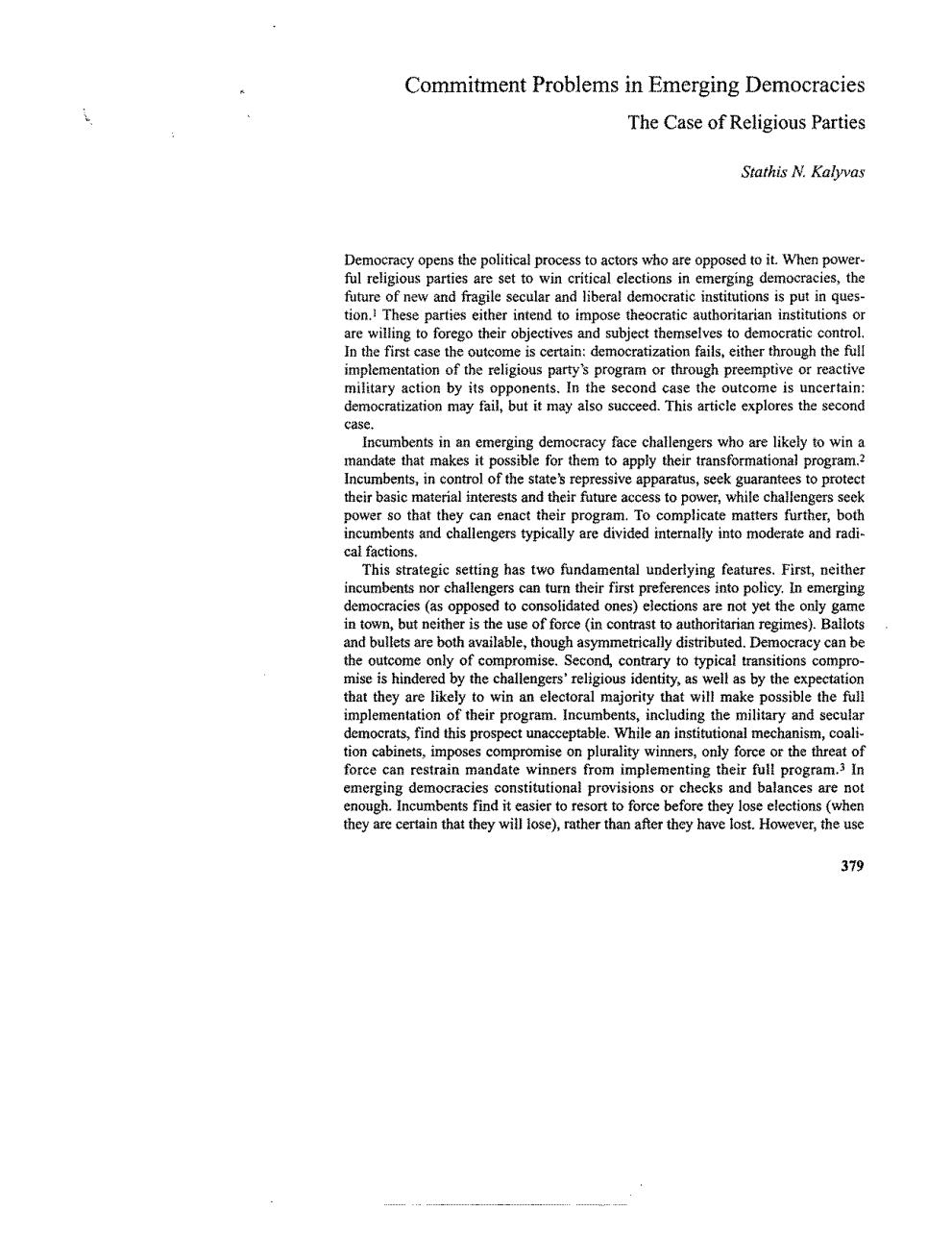
Commitment Problems in Emerging Democracies The Case of Religious Parties Stathis N.Kalyvas Democracy opens the political process to actors who are opposed to it.When power- ful religious parties are set to win critical elections in emerging democracies,the future of new and fragile secular and liberal democratic institutions is put in ques- tion.!These parties either intend to impose theocratic authoritarian institutions or are willing to forego their objectives and subject themselves to democratic control. In the first case the outcome is certain:democratization fails,either through the full implementation of the religious party's program or through preemptive or reactive military action by its opponents.In the second case the outcome is uncertain: democratization may fail,but it may also succeed.This article explores the second case. Incumbents in an emerging democracy face challengers who are likely to win a mandate that makes it possible for them to apply their transformational program.2 Incumbents,in control of the state's repressive apparatus,seek guarantees to protect their basic material interests and their future access to power,while challengers seek power so that they can enact their program.To complicate matters further,both incumbents and challengers typically are divided internally into moderate and radi- cal factions. This strategic setting has two fundamental underlying features.First,neither incumbents nor chaliengers can turn their first preferences into policy.In emerging democracies (as opposed to consolidated ones)elections are not yet the only game in town,but neither is the use of force (in contrast to authoritarian regimes).Ballots and bullets are both available,though asymmetrically distributed.Democracy can be the outcome only of compromise.Second,contrary to typical transitions compro- mise is hindered by the challengers'religious identity,as well as by the expectation that they are likely to win an electoral majority that will make possible the full implementation of their program.Incumbents,including the military and secular democrats,find this prospect unacceptable.While an institutional mechanism,coali- tion cabinets,imposes compromise on plurality winners,only force or the threat of force can restrain mandate winners from implementing their full program.3 In emerging democracies constitutional provisions or checks and balances are not enough.Incumbents find it easier to resort to force before they lose elections (when they are certain that they will lose),rather than after they have lost.However,the use 379
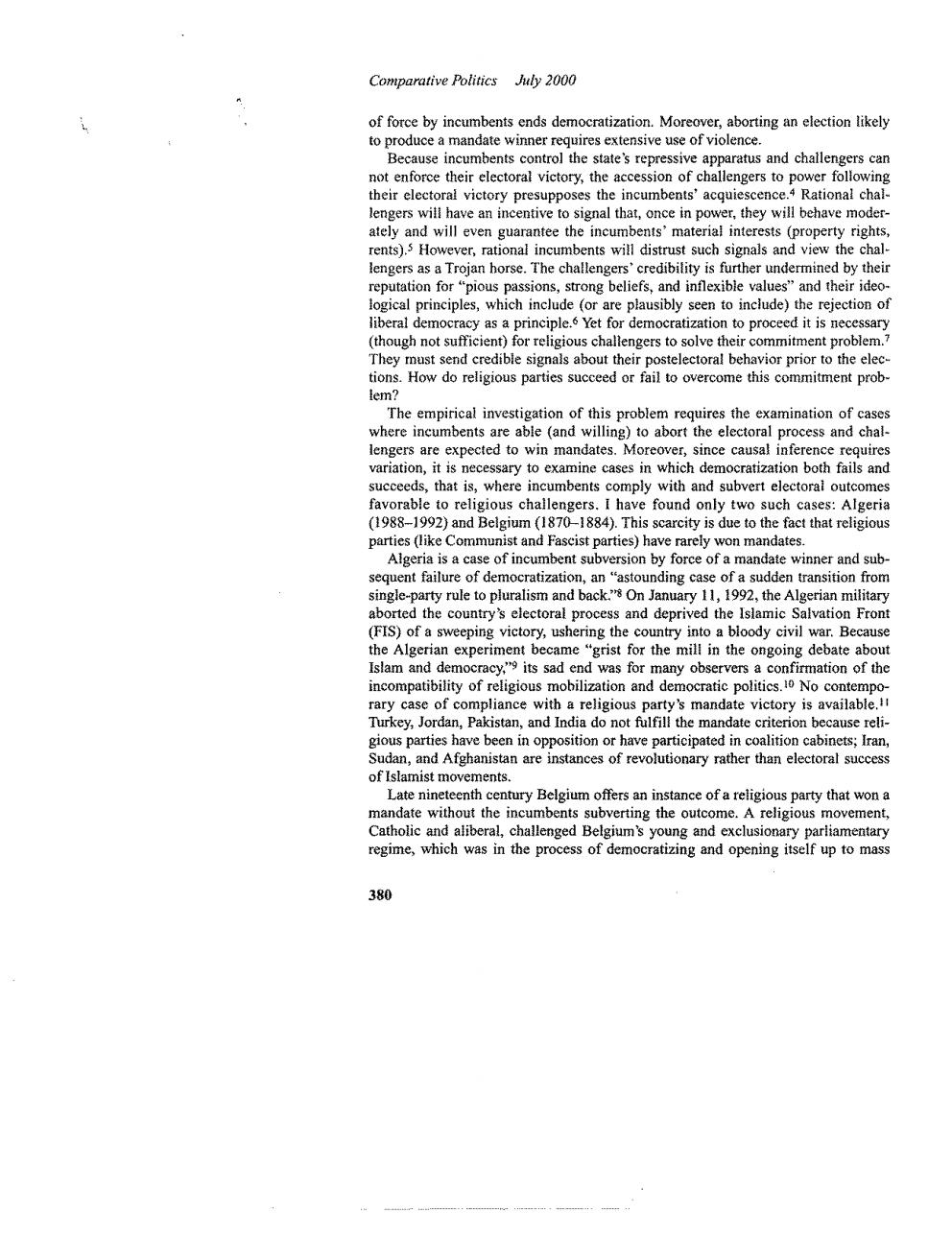
Comparative Politics July 2000 of force by incumbents ends democratization.Moreover,aborting an election likely to produce a mandate winner requires extensive use of violence. Because incumbents control the state's repressive apparatus and challengers can not enforce their electoral victory,the accession of challengers to power following their electoral victory presupposes the incumbents'acquiescence.4 Rational chal- lengers will have an incentive to signal that,once in power,they will behave moder- ately and will even guarantee the incumbents'material interests(property rights, rents).5 However,rational incumbents will distrust such signals and view the chal- lengers as a Trojan horse.The challengers'credibility is further undermined by their reputation for "pious passions,strong beliefs,and inflexible values"and their ideo- logical principles,which include (or are plausibly seen to include)the rejection of liberal democracy as a principle.6 Yet for democratization to proceed it is necessary (though not sufficient)for religious challengers to solve their commitment problem.? They must send credible signals about their postelectoral behavior prior to the elec- tions.How do religious parties succeed or fail to overcome this commitment prob- lem? The empirical investigation of this problem requires the examination of cases where incumbents are able(and willing)to abort the electoral process and chal- lengers are expected to win mandates.Moreover,since causal inference requires variation,it is necessary to examine cases in which democratization both fails and succeeds,that is,where incumbents comply with and subvert electoral outcomes favorable to religious challengers.I have found only two such cases:Algeria (1988-1992)and Belgium (1870-1884).This scarcity is due to the fact that religious parties (like Communist and Fascist parties)have rarely won mandates. Algeria is a case of incumbent subversion by force of a mandate winner and sub- sequent failure of democratization,an"astounding case of a sudden transition from single-party rule to pluralism and back"On January 11,1992,the Algerian military aborted the country's electoral process and deprived the Islamic Salvation Front (FIS)of a sweeping victory,ushering the country into a bloody civil war.Because the Algerian experiment became"grist for the mill in the ongoing debate about Islam and democracy,"9 its sad end was for many observers a confirmation of the incompatibility of religious mobilization and democratic politics.10 No contempo- rary case of compliance with a religious party's mandate victory is available.i Turkey,Jordan,Pakistan,and India do not fulfill the mandate criterion because reli- gious parties have been in opposition or have participated in coalition cabinets;Iran, Sudan,and Afghanistan are instances of revolutionary rather than electoral success of Islamist movements. Late nineteenth century Belgium offers an instance of a religious party that won a mandate without the incumbents subverting the outcome.A religious movement, Catholic and aliberal,challenged Belgium's young and exclusionary parliamentary regime,which was in the process of democratizing and opening itself up to mass 380

Stathis N.Kalyvas participation.The Catholic party,which for the first time included both moderate parliamentarians and grass-roots radicals,won the critical 1884 elections. Incumbents bowed to the electoral outcome even though they had the power to abort it.In turn,the Catholic party,despite the introduction of clerical reforms,did not apply its program in full or question Belgium's secular/liberal institutions.Catholics were incorporated into the liberal order,and religious mobilization proved compati- ble with democratization.Although religious parties arose in other European coun- tries during the late nineteenth century,none won a parliamentary majority.12 In the twentieth century authoritarian pro-Catholic movements ruled in Spain,Portugal, and Austria through military coups,not elections. The difficulty of isolating causality in a small-N comparison (overdetermina- tion)is well-known.However,a comparison designed around an analytical puzzle has the advantage of suggesting causal mechanisms and crucial variables that other- wise would be overlooked.Examination of these two cases in parallel does not imply their similarity in every respect.While they are different in many ways,they share a similar strategic setting.Comparison allows the identification of a key, though not obvious,factor in processes of democratization:the structure of reli- gious institutions.13 Credibility can be signaled by dramatic actions,such as a party's public denunciation of its central ideological planks (the Godesberg effect) and the purge of prominent radicals.14 Centralized,autocratic,and hierarchical reli- gious structures allow religious parties,which are typically young and divided,to implement such measures and overcome their commitment problem by credibly sig- naling future compliance. This comparison is limited to the analysis of a particular and well-defined strate- gic situation.It is not a full-fledged exploration of every facet of the process of democratization or a comprehensive examination of the two countries.After a brief description of Algeria and Belgium it examines two major explanations of the failure of democratization in Algeria and the implications of Belgian democratization. Algeria and Belgium The FIS appeared on the Algerian political scene in October 1988.In the aftermath of mass demonstrations against the regime's corruption the ruling party,the National Liberation Front(FLN),initiated a gradual process of liberalization.The constitution was revised to end one party rule,and the FIS was authorized in September 1989. Using both mosques and modern communications to propagate its message,the FIS evolved into a mass movement that combined electoralism with mass mobilization, giving rise to a veritable countersociety.Is It blended a critique of the regime with a utopian project:the "Islamic solution"and the Islamic state.This project was explic- itly aliberal and antidemocratic,but was also vague and malleable.16 The FIS mobi- 381
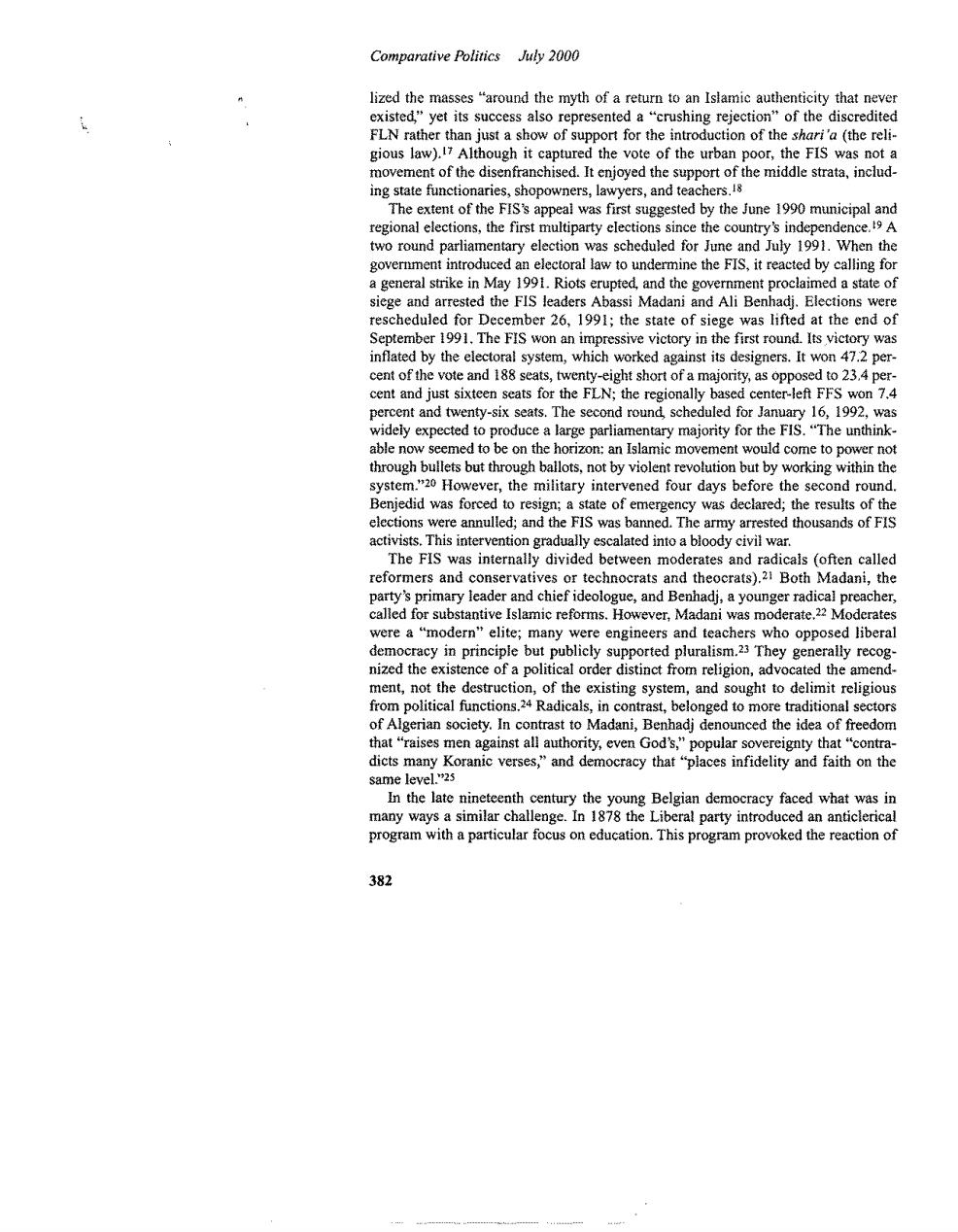
Comparative Politics July 2000 lized the masses"around the myth of a return to an Islamic authenticity that never existed,"yet its success also represented a "crushing rejection"of the discredited FLN rather than just a show of support for the introduction of the shari'a(the reli- gious law).17 Although it captured the vote of the urban poor,the FIS was not a movement of the disenfranchised.It enjoyed the support of the middle strata,includ- ing state functionaries,shopowners,lawyers,and teachers.18 The extent of the FIS's appeal was first suggested by the June 1990 municipal and regional elections,the first multiparty elections since the country's independence.19A two round parliamentary election was scheduled for June and July 1991.When the government introduced an electoral law to undermine the FIS,it reacted by calling for a general strike in May 1991.Riots erupted,and the government proclaimed a state of siege and arrested the FIS leaders Abassi Madani and Ali Benhadj.Elections were rescheduled for December 26,1991;the state of siege was lifted at the end of September 1991.The FIS won an impressive victory in the first round.Its victory was inflated by the electoral system,which worked against its designers.It won 47.2 per- cent of the vote and 188 seats,twenty-eight short of a majority,as opposed to 23.4 per- cent and just sixteen seats for the FLN;the regionally based center-left FFS won 7.4 percent and twenty-six seats.The second round,scheduled for January 16,1992,was widely expected to produce a large parliamentary majority for the FIS."The unthink- able now seemed to be on the horizon:an Islamic movement would come to power not through bullets but through ballots,not by violent revolution but by working within the system."20 However,the military intervened four days before the second round. Benjedid was forced to resign;a state of emergency was declared;the results of the elections were annulled;and the FIS was banned.The army arrested thousands of FIS activists.This intervention gradually escalated into a bloody civil war The FIS was internally divided between moderates and radicals (often called reformers and conservatives or technocrats and theocrats).21 Both Madani,the party's primary leader and chief ideologue,and Benhadj,a younger radical preacher, called for substantive Islamic reforms.However,Madani was moderate.22 Moderates were a "modern"elite;many were engineers and teachers who opposed liberal democracy in principle but publicly supported pluralism.23 They generally recog- nized the existence of a political order distinct from religion,advocated the amend- ment,not the destruction,of the existing system,and sought to delimit religious from political functions.24 Radicals,in contrast,belonged to more traditional sectors of Algerian society.In contrast to Madani,Benhadi denounced the idea of freedom that "raises men against all authority,even God's,"popular sovereignty that"contra- dicts many Koranic verses,"and democracy that "places infidelity and faith on the same level."25 In the late nineteenth century the young Belgian democracy faced what was in many ways a similar challenge.In 1878 the Liberal party introduced an anticlerical program with a particular focus on education.This program provoked the reaction of 382

Stathis N.Kalyvas the Catholic church,the polarization of polities,and the mass mobilization of Catholics.Boosted by this mobilization,the rejuvenated Catholic party won a large electoral victory in 1884 on the basis of a clerical program.Like the Algerian FIS, the Belgian Catholics were initially divided between the moderate parliamentarians of the Conservative party and radical (ultramontane)grass-roots activists.As a Belgian politician pointed out in 1879,"there are two Catholic parties,one favorable and the other hostile to the [liberal]constitution."26 The Catholic movement emerged during the 1860s but grew fast after 1878 to challenge the liberal (but nondemocratic)Belgian institutions.27 As a contemporary observer put it,"a whole army of publicists emerged,pretending that there existed a radical incompatibility between the Belgian constitution and Catholicism,between the country's religion and its political organization."28 This movement openly reject- ed liberalism and the separation between the religious and civil spheres.It called for the overthrow of the liberal order,defined as"the negation of the supernatural order applied to politics,exclusion of all religious influence in social relations,full eman- cipation of social power from divine revelation."29 The constitution was rejected. "We believe,together with the Church and like the Church,that the principles which flow from the Belgian Constitution are false and subversive,that the separation of Church and State is bad,and that the Constitution,in itself,is bad."30 This movement was supported by the lower clergy,controlled almost all the Catholic press,and built a large network of popular associations. Moderate Catholics could be found mostly among the parliamentarians of the Conservative party.Their ideal was,as one of their leaders put it,a "Christian monarchy,"but they were willing to compromise and"loyally accept"the liberal constitution,"a situation which is quite away from this ideal."31 They justified this choice in strategic rather than ideological terms,arguing that"it is more prudent and political to seek not the absolute,but more modestly,the possible and the relative.32 "By wanting that which we regard as the absolute good,we often jeopardize and lose the relative good."33 Although the moderates controlled the parliamentary party,they were weak at the grass roots,where the radicals agitated for the formation of a"truly Catholic party." A vehement conflict erupted between the two factions.At stake was the definition of political Catholicism and control of the Catholic party.Moderates accused radicals of being "very incompetent"and"unsuited for public life,"34 of"exercising a kind of terrorism on many Catholics"by "denouncing the moderates as semi-heretics,"35 of seeking"to substitute constitutional politics with theological ones,"and of aspiring "to overthrow all our political organization"by "unfurling a revolutionary flag."36 They demanded that the radicals abandon their maximalist discourse."In Belgium now...the Constitution is approved and legitimate,and is a good thing;Catholics can not obviously adopt these institutions for ever,but they can declare that they do not intend to use force in order to achieve any change."37 The radicals refused to comply 383
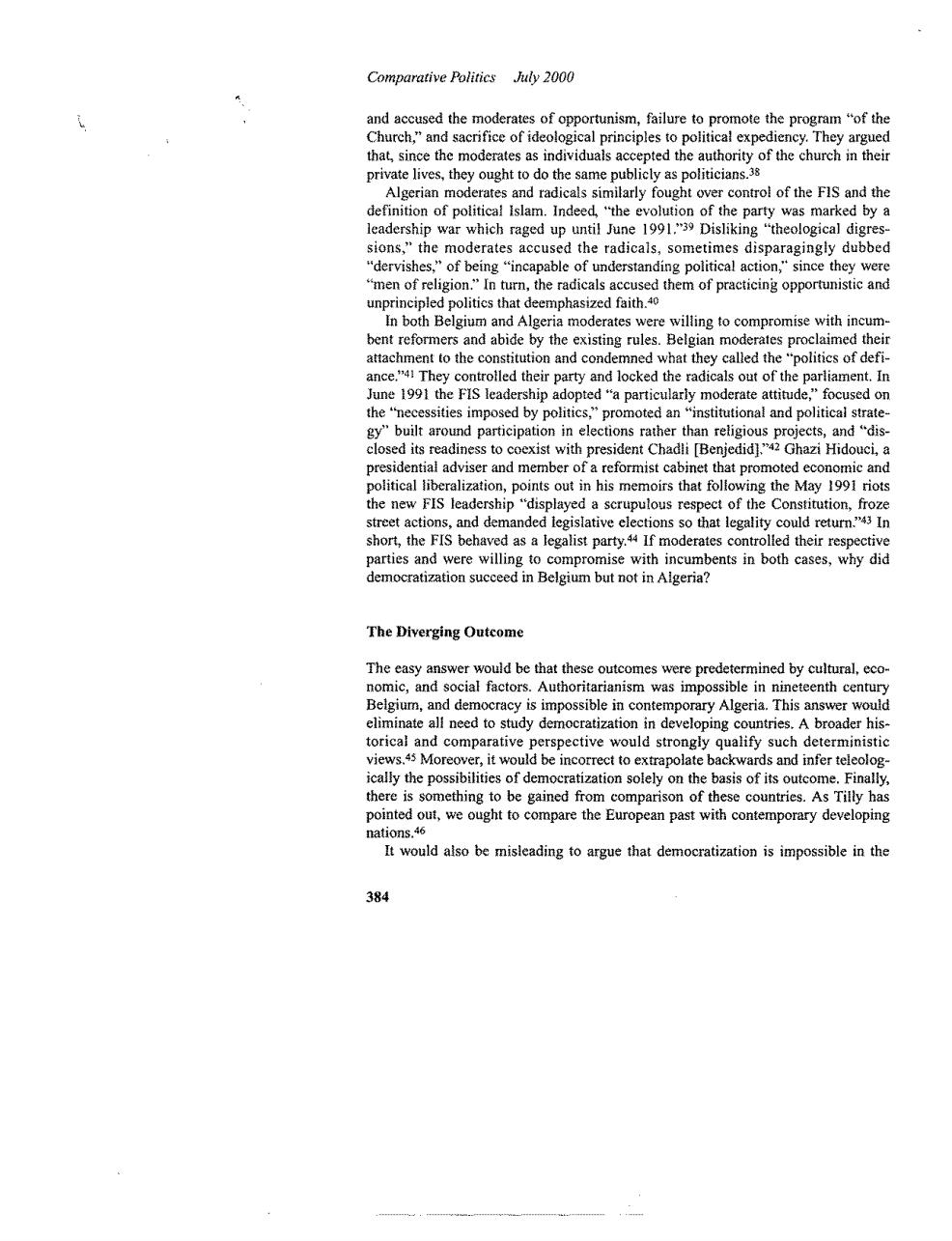
Comparative Politics July 2000 and accused the moderates of opportunism,failure to promote the program "of the Church,"and sacrifice of ideological principles to political expediency.They argued that,since the moderates as individuals accepted the authority of the church in their private lives,they ought to do the same publicly as politicians.38 Algerian moderates and radicals similarly fought over control of the FlS and the definition of political Islam.Indeed,"the evolution of the party was marked by a leadership war which raged up until June 1991."39 Disliking"theological digres- sions,"the moderates accused the radicals,sometimes disparagingly dubbed "dervishes,"of being "incapable of understanding political action,"since they were "men of religion."In turn,the radicals accused them of practicing opportunistic and unprincipled politics that deemphasized faith.40 In both Belgium and Algeria moderates were willing to compromise with incum- bent reformers and abide by the existing rules.Belgian moderates proclaimed their attachment to the constitution and condemned what they called the "politics of defi- ance."41 They controlled their party and locked the radicals out of the parliament.In June 1991 the FIS leadership adopted"a particularly moderate attitude,"focused on the "necessities imposed by politics,"promoted an"institutional and political strate- gy"built around participation in elections rather than religious projects,and"dis- closed its readiness to coexist with president Chadli [Benjedid]."42 Ghazi Hidouci,a presidential adviser and member of a reformist cabinet that promoted economie and political liberalization,points out in his memoirs that following the May 1991 riots the new FIS leadership"displayed a scrupulous respect of the Constitution,froze street actions,and demanded legislative elections so that legality could return."43 In short,the FIS behaved as a legalist party.44 If moderates controlled their respective parties and were willing to compromise with incumbents in both cases,why did democratization succeed in Belgium but not in Algeria? The Diverging Outcome The easy answer would be that these outcomes were predetermined by cultural,eco- nomic,and social factors.Authoritarianism was impossible in nineteenth century Belgium,and democracy is impossible in contemporary Algeria.This answer would eliminate all need to study democratization in developing countries.A broader his- torical and comparative perspective would strongly qualify such deterministic views.45 Moreover,it would be incorrect to extrapolate backwards and infer teleolog- ically the possibilities of democratization solely on the basis of its outcome.Finally, there is something to be gained from comparison of these countries.As Tilly has pointed out,we ought to compare the European past with contemporary developing nations.46 It would also be misleading to argue that democratization is impossible in the 384
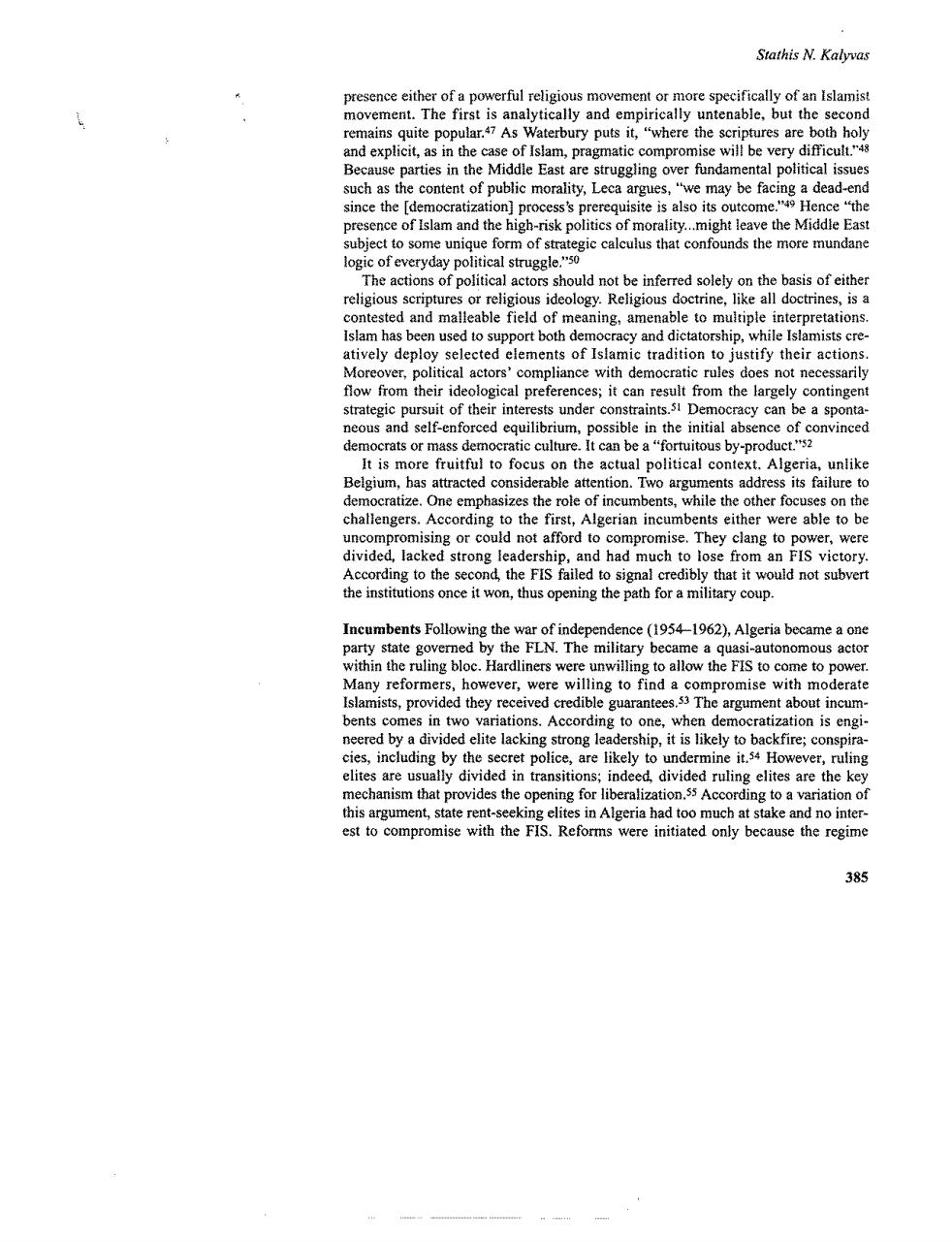
Stathis N.Kalyvas presence either of a powerful religious movement or more specifically of an Islamist movement.The first is analytically and empirically untenable,but the second remains quite popular.47 As Waterbury puts it,"where the scriptures are both holy and explicit,as in the case of Islam,pragmatic compromise will be very difficult."48 Because parties in the Middle East are struggling over fundamental political issues such as the content of public morality,Leca argues,"we may be facing a dead-end since the [democratization]process's prerequisite is also its outcome."49 Hence "the presence of Islam and the high-risk politics of morality...might leave the Middle East subject to some unique form of strategic calculus that confounds the more mundane logic of everyday political struggle"50 The actions of political actors should not be inferred solely on the basis of either religious scriptures or religious ideology.Religious doctrine,like all doctrines,is a contested and malleable field of meaning,amenable to multiple interpretations. Islam has been used to support both democracy and dictatorship,while Islamists cre- atively deploy selected elements of Islamic tradition to justify their actions. Moreover,political actors'compliance with democratic rules does not necessarily flow from their ideological preferences;it can result from the largely contingent strategic pursuit of their interests under constraints.5i Democracy can be a sponta- neous and self-enforced equilibrium,possible in the initial absence of convinced democrats or mass democratic culture.It can be a"fortuitous by-product."32 It is more fruitful to focus on the actual political context.Algeria,unlike Belgium,has attracted considerable attention.Two arguments address its failure to democratize.One emphasizes the role of incumbents,while the other focuses on the challengers.According to the first,Algerian incumbents either were able to be uncompromising or could not afford to compromise.They clang to power,were divided,lacked strong leadership,and had much to lose from an FIS victory. According to the second,the FIS failed to signal credibly that it would not subvert the institutions once it won,thus opening the path for a military coup. Incumbents Following the war of independence(1954-1962),Algeria became a one party state governed by the FLN.The military became a quasi-autonomous actor within the ruling bloc.Hardliners were unwilling to allow the FIS to come to power. Many reformers,however,were willing to find a compromise with moderate Islamists,provided they received credible guarantees.53 The argument about incum- bents comes in two variations.According to one,when democratization is engi- neered by a divided elite lacking strong leadership,it is likely to backfire;conspira- cies,including by the secret police,are likely to undermine it.54 However,ruling elites are usually divided in transitions;indeed,divided ruling elites are the key mechanism that provides the opening for liberalization.s5 According to a variation of this argument,state rent-seeking elites in Algeria had too much at stake and no inter- est to compromise with the FIS.Reforms were initiated only because the regime 385
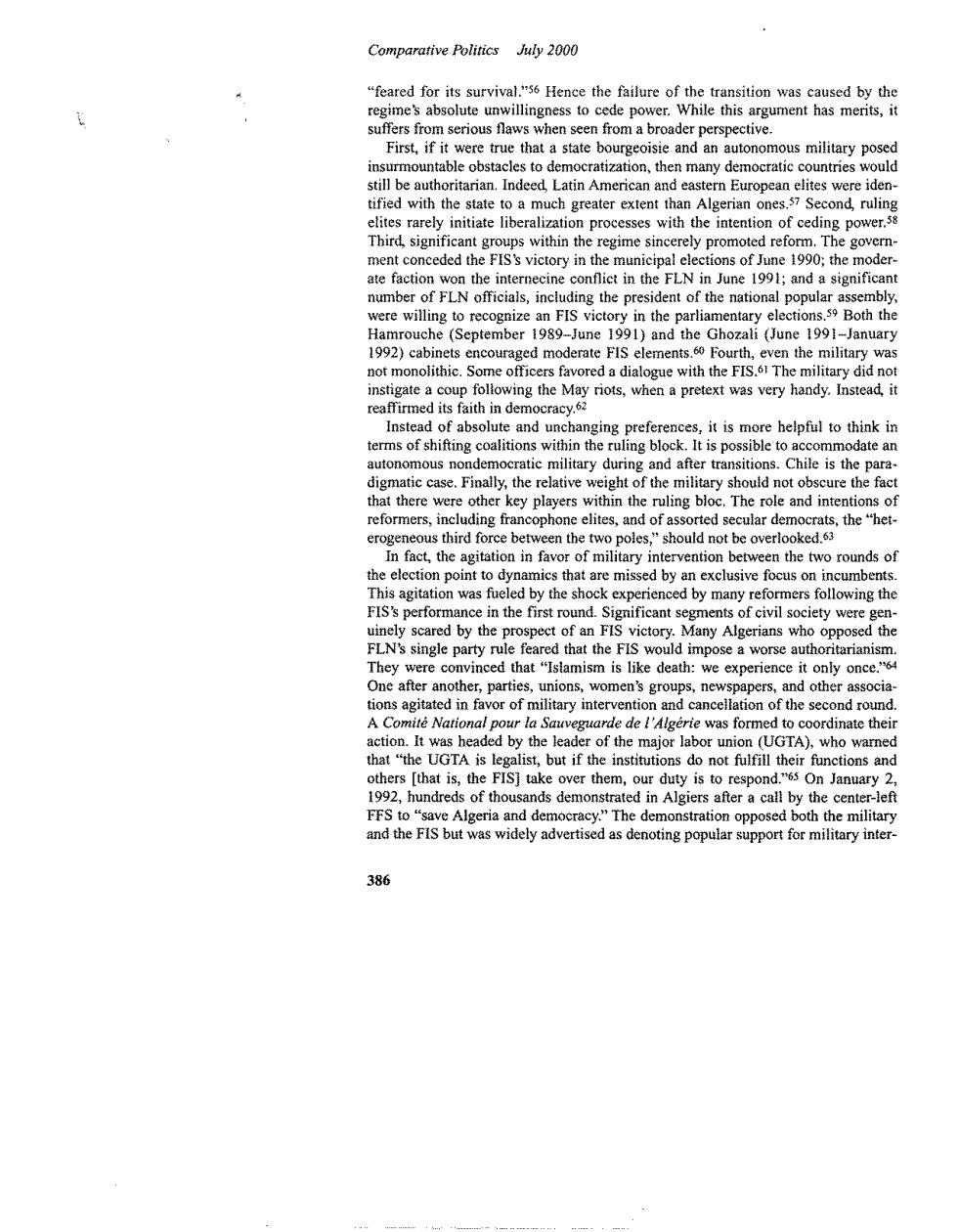
Comparative Politics July 2000 "feared for its survival."56 Hence the failure of the transition was caused by the regime's absolute unwillingness to cede power.While this argument has merits,it suffers from serious flaws when seen from a broader perspective. First,if it were true that a state bourgeoisie and an autonomous military posed insurmountable obstacles to democratization,then many democratic countries would still be authoritarian.Indeed Latin American and eastern European elites were iden- tified with the state to a much greater extent than Algerian ones.57 Second,ruling elites rarely initiate liberalization processes with the intention of ceding power.58 Third,significant groups within the regime sincerely promoted reform.The govern- ment conceded the FIS's victory in the municipal elections of June 1990;the moder- ate faction won the internecine conflict in the FLN in June 1991;and a significant number of FLN officials,including the president of the national popular assembly, were willing to recognize an FIS victory in the parliamentary elections.s9 Both the Hamrouche (September 1989-June 1991)and the Ghozali (June 1991-January 1992)cabinets encouraged moderate FIS elements.60 Fourth,even the military was not monolithic.Some officers favored a dialogue with the FIS.61 The military did not instigate a coup following the May riots,when a pretext was very handy.Instead,it reaffirmed its faith in democracy.62 Instead of absolute and unchanging preferences,it is more helpful to think in terms of shifting coalitions within the ruling block.It is possible to accommodate an autonomous nondemocratic military during and after transitions.Chile is the para. digmatic case.Finally,the relative weight of the military should not obscure the fact that there were other key players within the ruling bloc.The role and intentions of reformers,including francophone elites,and of assorted secular democrats,the "het- erogeneous third force between the two poles,"should not be overlooked.63 In fact,the agitation in favor of military intervention between the two rounds of the election point to dynamics that are missed by an exclusive focus on incumbents. This agitation was fueled by the shock experienced by many reformers following the FIS's performance in the first round.Significant segments of civil society were gen- uinely scared by the prospect of an FIS victory.Many Algerians who opposed the FLN's single party rule feared that the FIS would impose a worse authoritarianism. They were convinced that"Islamism is like death:we experience it only once."64 One after another,parties,unions,women's groups,newspapers,and other associa- tions agitated in favor of military intervention and cancellation of the second round. A Comite National pour la Sauveguarde de l'Algerie was formed to coordinate their action.It was headed by the leader of the major labor union (UGTA),who warned that"the UGTA is legalist,but if the institutions do not fulfill their functions and others [that is,the FIS]take over them,our duty is to respond."65 On January 2, 1992,hundreds of thousands demonstrated in Algiers after a call by the center-left FFS to"save Algeria and democracy."The demonstration opposed both the military and the FIS but was widely advertised as denoting popular support for military inter- 386
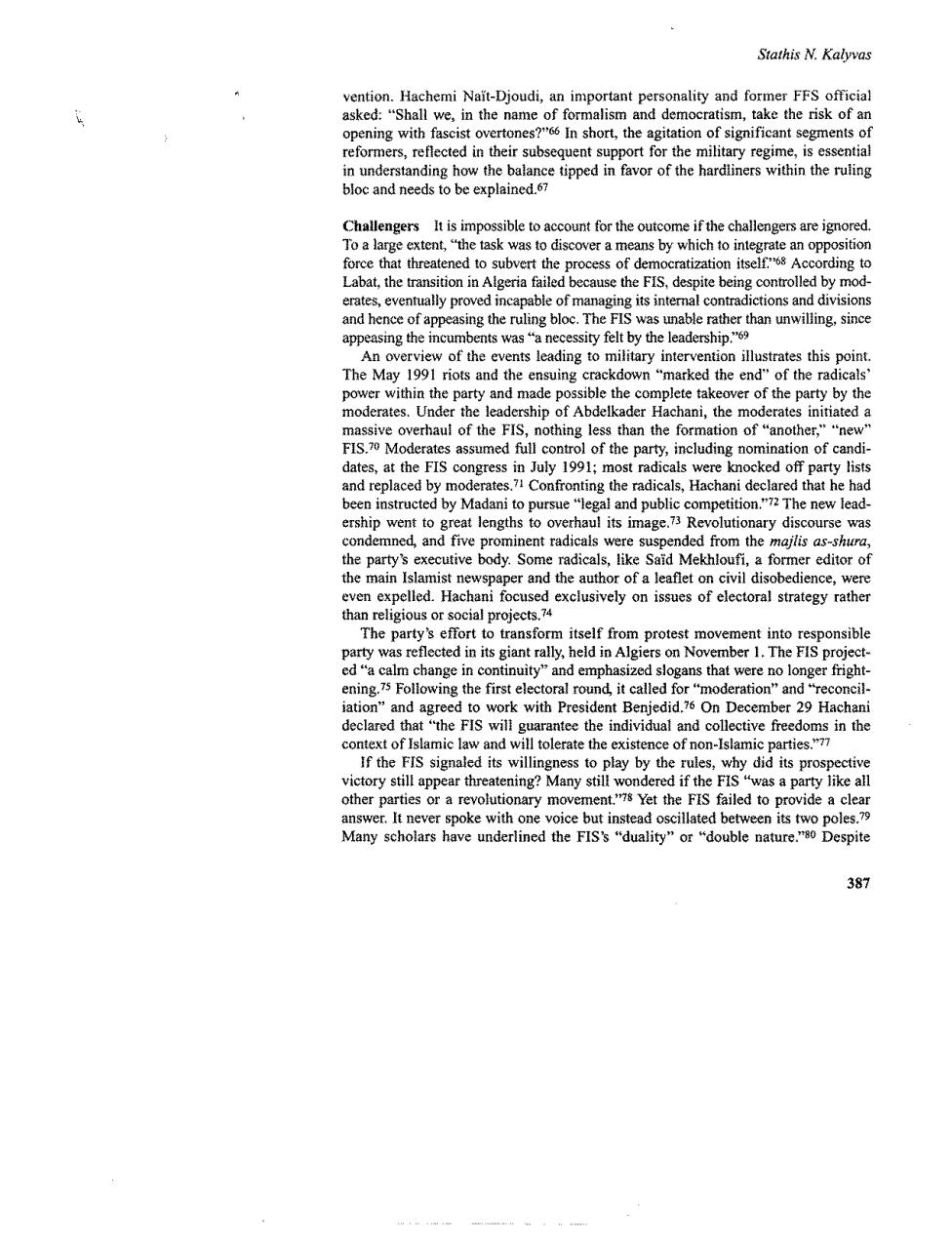
Stathis N.Kalyvas vention.Hachemi Nait-Djoudi,an important personality and former FFS official asked:"Shall we,in the name of formalism and democratism,take the risk of an opening with fascist overtones?"66 In short,the agitation of significant segments of reformers,reflected in their subsequent support for the military regime,is essential in understanding how the balance tipped in favor of the hardliners within the ruling bloc and needs to be explained.67 Challengers It is impossible to account for the outcome if the challengers are ignored. To a large extent,"the task was to discover a means by which to integrate an opposition force that threatened to subvert the process of democratization itself"68 According to Labat,the transition in Algeria failed because the FIS,despite being controlled by mod- erates,eventually proved incapable of managing its internal contradictions and divisions and hence of appeasing the ruling bloc.The FIS was unable rather than unwilling,since appeasing the incumbents was"a necessity felt by the leadership."69 An overview of the events leading to military intervention illustrates this point. The May 1991 riots and the ensuing crackdown "marked the end"of the radicals' power within the party and made possible the complete takeover of the party by the moderates.Under the leadership of Abdelkader Hachani,the moderates initiated a massive overhaul of the FIS,nothing less than the formation of "another,""new" FIS.70 Moderates assumed full control of the party,including nomination of candi- dates,at the FIS congress in July 1991;most radicals were knocked off party lists and replaced by moderates.71 Confronting the radicals,Hachani declared that he had been instructed by Madani to pursue"legal and public competition."72 The new lead- ership went to great lengths to overhaul its image.73 Revolutionary discourse was condemned,and five prominent radicals were suspended from the majlis as-shura the party's executive body.Some radicals,like Said Mekhloufi,a former editor of the main Islamist newspaper and the author of a leaflet on civil disobedience,were even expelled.Hachani focused exclusively on issues of electoral strategy rather than religious or social projects.74 The party's effort to transform itself from protest movement into responsible party was reflected in its giant rally,held in Algiers on November 1.The FIS project- ed"a calm change in continuity"and emphasized slogans that were no longer fright- ening.75 Following the first electoral round,it called for"moderation"and "reconcil- iation"and agreed to work with President Benjedid.76 On December 29 Hachani declared that"the FIS will guarantee the individual and collective freedoms in the context of Islamic law and will tolerate the existence of non-Islamic parties."77 If the FIS signaled its willingness to play by the rules,why did its prospective victory still appear threatening?Many still wondered if the FIS "was a party like all other parties or a revolutionary movement."78 Yet the FIS failed to provide a clear answer.It never spoke with one voice but instead oscillated between its two poles.79 Many scholars have underlined the FIS's"duality"or "double nature."80 Despite 387

Comparative Politics July 2000 their efforts,the moderates did not manage to silence the radicals.Party statements remained vague or contradictory."The FiS had almost always two discourses,one maximalist,the other minimalist.One threatened,the other appeased;one accelerat- ed,the other braked.It handled confrontation and negotiation....the desire for a radi- cal rupture with the existing order coexisted with the electoralist strategy."8)There were "innumerable cases of people speaking in the name of the FIS and saying the same thing and its opposite during the same day.Even at the top,leaders were unable to avoid such contradictions.....The FIS]has always been ambiguous,lacking offi- cial and definitive public positions to determine [its intentions]."82 In critical moments,"moderate declarations were stifled by radical ones."83 Indeed,at the November I rally,which the FIS used as a showcase of its moderate image, Benhadj's seven-year-old son reminded party supporters of his father's favorite dic- tum:"neither Chart,nor Constitution,only God and his Prophet."The crowd responded"al-thawra al-islamiyya"(Islamic revolution).84 The inability of the moderate FIS leadership to silence the radicals and thus "restrain its own radical impulses"was particularly damaging during the critical period of high uncertainty between the two rounds.85 For example,a leading figure of the FIS,Mohammed Said,declared that the "nutritional and clothing habits of Algerians"would have to change after the party's victory;this statement amplified by the media,sent shivers through "thoroughly frightened"secular Algerians.86 Although the party reiterated its decision to protect freedom and condemned"irre- sponsible declarations that can threaten the country's civil peace and unity,"the dam- age was done.87 In fact,Hachani was overwhelmed by these developments;they left the FIS"vulnerable to criticism and skepticism regarding the true nature of [its]ulti- mate agenda."88 Charef summarizes the issue as follows:"Was a negotiation with the FIS possible,so that it could accede to power without destabilizing the country? Would [the FIS]be able to manage things without too many pitfalls and play the democratic game?....This was a risk military leaders did not want to take,because they thought that the moderates within the FIS would be beaten by the radicals."89 The FIS failed to solve its commitment problem.It failed to signal that once in power it would not establish a religious dictatorship;it failed to convey that the mod- erates were in control.Comparison of Algeria and Belgium proves fruitful in explaining this failure.It uncovers a crucial factor that remains invisible in case studies and comparative sampling on the dependent variable. Belgium In contrast to Algeria,moderate Belgian Catholics were able to put a swift end to the "confusion between politics and religion"prior to the 1884 elections.90 Credibility hinges largely on the cost of the signal to its sender.In Belgium the conflict between 388